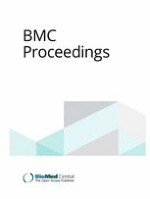Erschienen in:

Open Access
01.10.2016 | Proceedings
Imputing rare variants in families using a two-stage approach
verfasst von:
Samantha Lent, Xuan Deng, L. Adrienne Cupples, Kathryn L. Lunetta, CT Liu, Yanhua Zhou
Erschienen in:
BMC Proceedings
|
Sonderheft 7/2016
Einloggen, um Zugang zu erhalten
Abstract
Background
Recent focus on studying rare variants makes imputation accuracy of rare variants an important issue. Many approaches have been proposed to increase imputation accuracy among rare variants, from reference panel selection to combinations of existing methods to multistage analyses. We aimed to bring the strengths of these new approaches together with our proposed two-stage imputation for family data.
Methods
Our imputation methods were tested on the region from 46.75Mb to 49.25Mb on chromosome 3. We did quality control based on the proportion of missing genotypes per variant and individual, leaving 495 individuals with 761 genome-wide association studies (GWAS) variants only, 45 with 14,077 sequence variants only, and 419 with both GWAS and sequencing data. All data were prephased using SHAPEIT2 with a duo hidden Markov model algorithm prior to performing imputation. Imputations were performed 100 times, each time masking the sequence data for 1 individual and imputing it from the GWAS data. We used well-imputed genotypes, defined as a probability of greater than 0.9, above 2 different minor allele frequency cutoffs—0.01 and 0.05—from Impute2 as input for Merlin, and compared these results to Impute2 and Merlin separately. The imputed results were evaluated using correlation measurement and the imputation quality score.
Results
Our method improved imputation accuracy, measured by imputation quality score, for variants with minor allele frequency between 0.01 and 0.40, but failed to improve accuracy for variants with minor allele frequency less than 0.01 when we used a minor allele frequency cutoff of 0.01 for the Impute2 results. In contrast, our 2-stage approach with a minor allele frequency cutoff of 0.05 performed the worst of all methods for variants with minor allele frequency between 0.01 and 0.40.
Conclusions
This method gave promising results, but may be further improved by changing the inclusion criteria of Impute2 variants. More analyses are needed on a larger region with different inclusion thresholds to assess the accuracy of this approach.